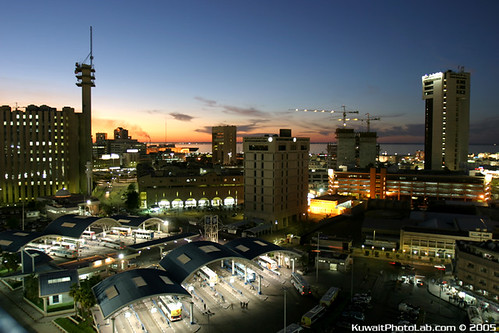cataclysm
الله بالخير
للتفكير
27/07/2006
لأهمية ما ورد في مقال ابن الأخ نجيب.. أترك له العمود ليحل ضيفا.. والله من وراء القصد.
محمد مساعد الصالح
العم العزيز بو طلال
قرأت مقالك المنشور في جريدة 'القبس' بعنوان 'للتفكير'، يوم الثلاثاء 2006/7/25 لذلك فكرت.. والله يستر.
قرار الحرب أو قرار السلم، لا أعلم أيهما أسهل.. فقد فشل العالم العربي في تحقيق الاثنين.
حين وصفت المملكة العربية السعودية التحريض للأحداث في لبنان وغزة عن طريق خطف جنود اسرائيليين ب'المغامرة' التي ينقصها الدعم المشترك والتنسيق، كان ذلك في نظري بمنزلة تفسير جيد لوصف الحالة التي يعيشها العالم العربي اليوم - نتيجة لمغامرات مشابهة على مدى العشرين او الثلاثين سنة الماضية - في كلمة واحدة.
خلال الهجوم الاسرائيلي الأخير على لبنان، استمعنا من خلال الفضائيات الى نتائج استطلاعات الرأي العديدة التي تجريها وسائل الإعلام المختلفة حول رأي الشعب الاسرائيلي في ما تفعله حكومته في لبنان، وعلى ما يبدو فإن هناك تأييدا شاملا من الشعب الاسرائيلي للإجراءات التي تتخذها حكومته لعلاج المشاكل الناتجة من المغامرات في جنوب لبنان وغزة. في اعتقادي ان هذا التأييد الشعبي هو بالفعل القوة الحقيقية للجيش الاسرائيلي، وانه لولا هذا التأييد لما نفعت الاسلحة الاميركية مهما كانت قوتها وحداثتها. والتاريخ مليء بأمثلة لانتصارات عديدة دون استخدام الاسلحة. اذا لا بد من الحصول على تأييد شعبي لقضايانا 'على مستوى العالم العربي' قبل الخوض في أي حروب في المستقبل، والا فإن النتيجة ستكون الفشل.
نحن تنقصنا القدرة على الصبر لنتمكن من تجربة القوة التي يمكننا ان نجنيها خلال فترات السلم، والى حين اقتناعنا بقدرتنا ونعيد لشعوبنا الأمان والاستقرار والثقة بالنفس قبل الخوض في حروب نتائجها السلبية معروفة مسبقا.
منذ الهجوم الياباني على الولايات المتحدة الاميركية في بيرل هاربر بواسطة طيارين انتحاريين 'كاماكازي' وحتى هذا اليوم لم يتحقق اي انتصار في حرب جنودها افراد يفضلون الموت على الحياة.
علمنا التاريخ انه ليتحقق النصر لا بد ان يقتنع المقاتل بأنه يقاتل ليس من اجل ان يموت شهيدا بل من اجل حياة افضل له ولوطنه.
ان المواطن العربي الإنسان هو العنصر الاهم والأساسي في أي معادلة يتم التوصل اليها سواء في حالة السلم او الحرب، وما قيمة الارض اذا كان الانسان المقيم عليها ذليلا منهارا لا يمكنه تصحيح وضعه الا بالانتحار.
وبعد التفكير ايضا قررت ان النصر يمكنه ان يتحقق عن طريق الحرب كما يمكنه ان يتحقق عن طريق السلم، اذا كان النصر يعني الحياة الآمنة المستقرة النامية.
العم بو طلال
كما ذكرت في مقالك 'للتفكير' فإننا ضعاف من الناحية العسكرية، ولا يمكننا الانتصار على اي عدو في وضعنا الحالي عن طريق الحروب العسكرية. هناك خلاف حول من هو العدو الحقيقي، وخلاف حول من هو الصديق الحقيقي، وخلاف حول الأسلوب الأمثل للمعركة، وخلاف حول الهدف، ومعنى النصر، 'حيث ان ما قد يعتبره حزب الله نصرا ربما يعتبره لبناني آخر غير ذلك'.
لذلك وبعد المزيد من التفكير ربما علينا محاولة الانتصار على العدو من خلال السلم وتنمية الإنسان اولا. لا شك في ان ذلك قد يتطلب بعض الوقت، لكن النتائج ربما تكون اكثر ايجابية مما جنيناه عبر العقود الماضية.
الشعوب العربية في حاجة الى فترة لا تقل عن عشرين سنة من السلم والأمان، للتنمية والتعليم ولاتاحة الفرصة لاجيال جديدة تتمتع بثقافة عالية وثقة بالنفس باستطاعتها اختيار نوعية الحروب التي ترغب في خوضها ونوعية السلاح والتوقيت المناسب لها. اجيال تفضل الحياة على الموت، تحارب للحصول على حياة افضل بدل الاستشهاد، جيل تنجب فيه العائلة ابناء يساهمون في التنمية ويكافحون لحياة افضل، يستمتعون بنعم الله في الأرض مثل باقي البشر.
أعتقد بعد التفكير ان الوقت قد حان.
نجيب حمد مساعد الصالح



